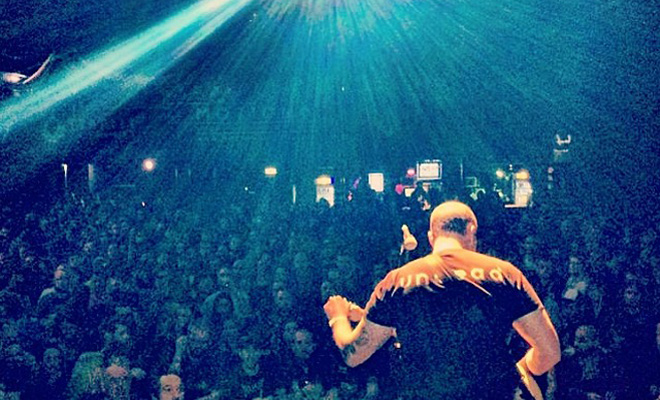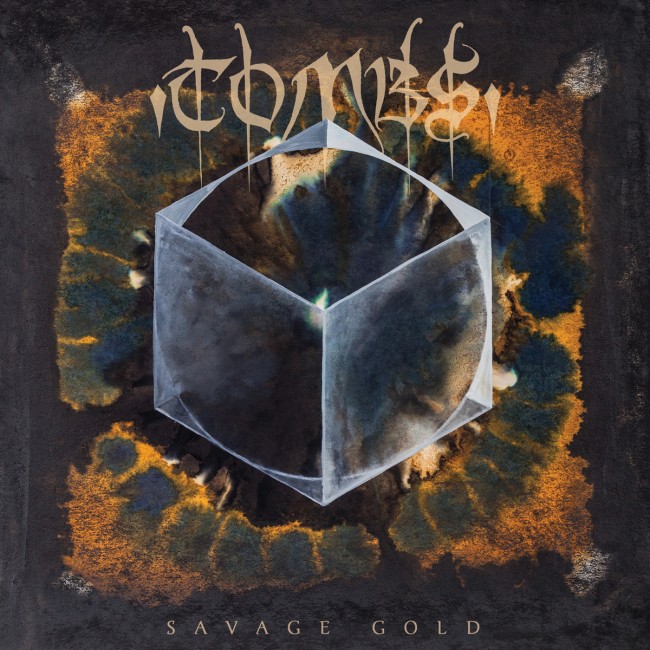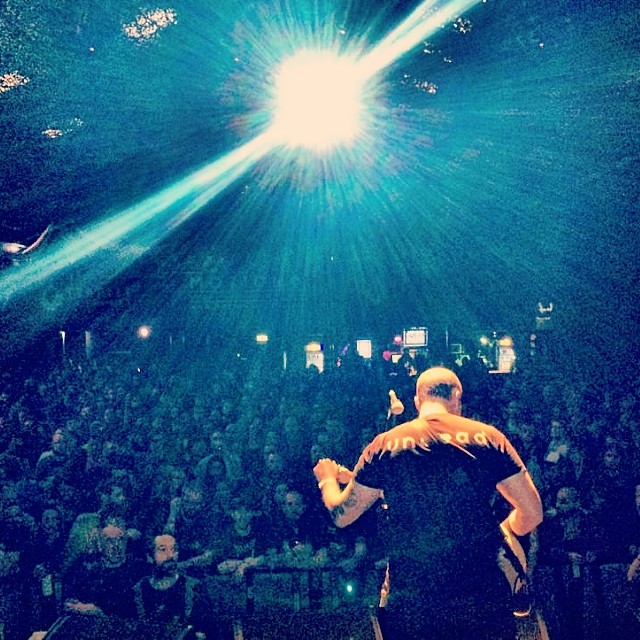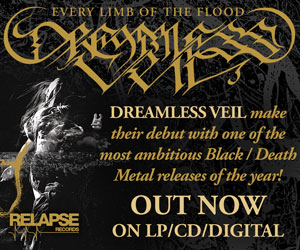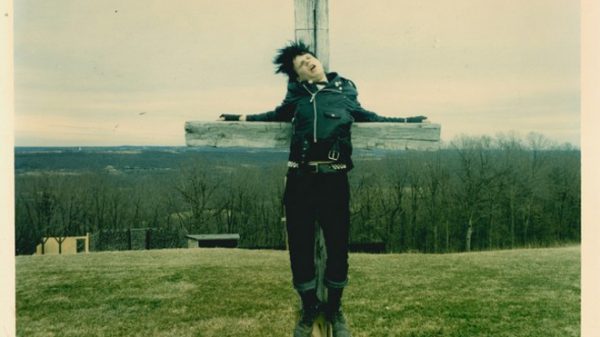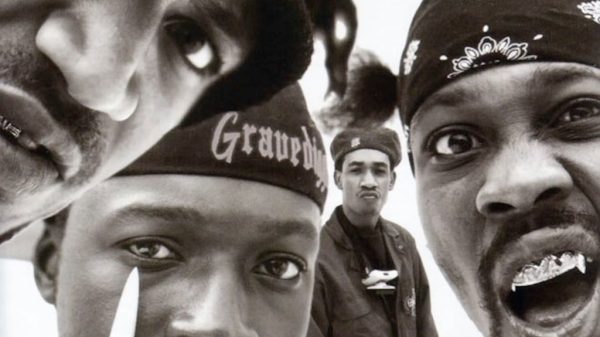In our correspondence for the Savage Gold review and stream, I spoke to my good friend Mike Hill of Tombs. We had a back and forth email interview about the album, Tombs in the year 2014 and general influences on life and music.
Mike is a great guy. I’ve known him for many years now and I have always been impressed by his intensity and musical vision. All the bands he played in have broken boundaries of genre. Despite all the different incarnations of his vision, all his bands carry a red line connecting all the dots. His ability to combine heaviness and melody appeals to me in so many ways. To know that he is a great person who creates fantastic music is a fantastic thing. Interviews with him are always fun (you can read an older interview between us here) and this one was too. Hope you enjoy it as much as I did.
Mike, the release of Tombs’ third full-length is at hand. How does it feel to be so close to the final step of a record: Its initial release? Do you feel a kind of relief, or is more like tension and anticipation for how people will react?
Mike Hill: I feel relief that we successfully completed the record and no one was seriously injured or emotionally scarred at the end of the process. It was a really long, hard process this time around, but well worth it. As far as how people react, I don’t normally pay too much attention to that. Some people will like it, some people will be indifferent and some people will think it sucks. There isn’t much I can do about that. I feel fortunate to be able to do work that I feel good about, I suppose that is the bottom line.
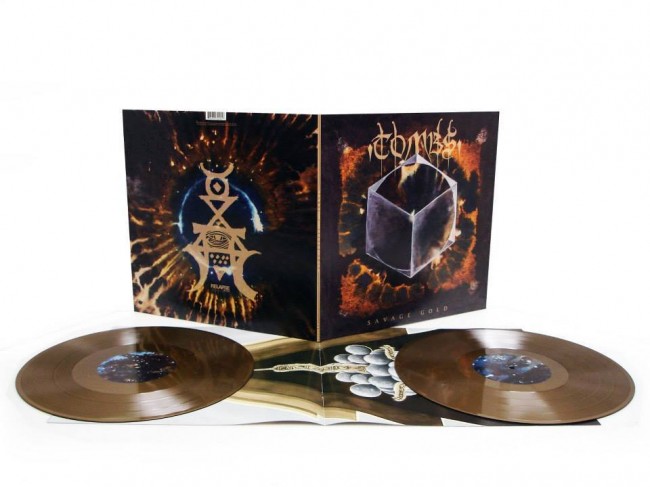
I followed your journal on the process of the recording (Please check Mike’s website everythingwentblackmedia.com for updates, podcasts etc.). You describe a really tense scenario, if I read correctly between the lines: coming out of a stressful day-to-day routine, packing, playing a last show with only new material, heading out to Florida and working there under time pressure and being in the studio with an absolute dead-on pro. As I know you a bit better, I’d say that this seems to be a ‘Mike Hill Special’: working under a cracking pressure and delivering the absolute best possible at this point in time. Do you think think SAVAGE GOLD represents Tombs at the top of its game right now? How much did Eric Rutan (Hate Eternal/Morbid Angel) bring out in the band you didn’t know was there before?
That is 100% true. Savage Gold represents Tombs at it’s absolute best. All of the tones, performances, vibe…it’s the best we could possibly have done. Rutan is a scientist when it comes to recording. We’ve worked with really talented guys in the past, but Rutan totally understands what we’re trying to do. We spent a lot of time with demos and discussing what we want the record to sound like. As a result of our experiences with Erik, I’ve re-thought my whole gameplan when it comes to equipment, guitar string gauge, use of effects. Savage Gold is “dry” compared to our other records. We dialed back the reverb quite a bit so that the guitars can have a little more presence, so there isn’t this dark cloud of swirling overdubs on this record, everything is a lot more concise. It put me out of my comfort zone, because since the beginning of the band, I’ve always drenched everything with effects, but to make the record that we all wanted, we needed to try new things. All of that came from Rutan.
Being a friend and fan of Tombs since day one, that was also the first thing that came to my mind when I heard the record: it’s dry – and therefore it sounds even harsher. I would go as far as to say that Tombs never sounded more metal. This picture also came to me when I heard that you were recording with Rutan mixed with live footage of the latest installment of Tombs’ line up. I’ve known you guys since you started. Except for you, Mike, no founding member of the band is left. After long-time bass player Carson James left the band, it was you and Andrew Hernandez. Now you have two members in the band that are familiar faces to NY’s heavy music scene. Tombs developed through various stages to the entity it is today. Did the step towards “Metal” (which sounds kind of odd to say) happen by accident? Was it conscious and the line-up change inevitable? Was Rutan, therefore, the best choice as a producer?
I think that each Tombs record has been moving in a more aggressive, overtly metal direction, so, at least to me, it feels natural that our latest record is way harsher than our other records. Most of the material was written before we actually had this lineup finalized. This last writing cycle consisted mainly of me and Andrew banging it out in the practice space. Ben and Garett absolutely add a layer of technical proficiency that has never been present in the band. Rutan is our guy; as long as we have a budget with enough to afford him, we will be working with Erik Rutan.
A lot of the songs sound much more layered than previous material. The textures are very interesting and beneficial. I guess both new members were able to contribute in the rehearsals as well as in the studio. Andrew plays more intensely than ever before. Did all four of you play in the studio and could you tell Rutan “No, that’s not how we want it,” or was he the man with the master plan? I’m asking as I know how much you want to have control over what happens in the studio. I guess a man with such experience in recording heavy music has a clear vision of how a record should sound. Was there tension in the studio or was it more like smooth sailing?
We tracked everything separately. I actually pre-recorded a scratch guitar track to a click and Andrew played along to it by himself. I like to think that I have a good ear, but it’s not even close to the skill that Rutan possesses. His big thing is tuning and being able to detect slight tuning variations. A lot of the punch-ins for the guitar tracks had to do with tuning. He has this insane ear for that kind of stuff. In the past, I wanted to be in control, but this time around, I wanted the responsibility to monitor the performances given to someone else. By the time we got to the studio, the songs had been rehearsed and beaten into our heads. There was really only one way to go with the material: the way we had rehearsed it. I’ve never been one to experiment much in the studio, anyway. All of the experimentation is done in the practice space; when we get to the recording session, it’s time to execute.
And execute you did. The record is a close to a 60 minute long monster that shifts through various nuances and stylistic variations of contemporary heavy music. The sound is definitely as metal as can be, and Rutan gave Tombs a great new face. I think you guys dared more than ever before and included more of the variety of influences you all have as individuals. This time around, despite all the technical aspects within the songs, I feel that Tombs perfected what they always did best: write variable, impressive songs that are in themselves very easy to access. I try to incorporate this with Planks, too. It’s a balance of playing technical without sounding like Mathcore, a stylistic aspect I always love about Black Metal. But I would go one step further as to say you narrowed it down even more and gave room, in your own way, for two of your favorite bands: Celtic Frost and Killing Joke. After every play I think that these two bands somehow were the godfathers to Savage Gold. This brings me to two questions: a) How does Tombs approach songwriting and b) what were the main influences in the process of writing these songs?
The process starts with me banging out riffs in my home studio and recording them to click tracks. Andrew and I are the prime writers; his input is mainly arrangement and tempos; that’s been the process since he joined the band. Ben and Garett add their parts when we start rehearsing the songs in the practice room. The lyric writing is an ongoing process. I keep notebooks that I write ideas in, mostly in prose form or in little fragments. I free associate these ideas and they end up being reduced to a version of the lyrics. Some of the ideas have been hanging around for a really long time in my notebooks and just now have manifested. It’s a beautiful process; to have written something over ten years ago, having forgotten about it and at exactly the right moment, finding those few lines that fit perfectly. That’s the story for “Deathtripper” – I wrote the lyrics back in the late 90’s. They could have easily become lyrics to an Anodyne song, but for some reason they languished in a notebook.
As far as influences during the process of writing the songs, I have to point to Carl McCoy and Fields of the Nephilim, Swans, Tryptikon, Celtic Frost, Virus…bands like that. Movies also play heavily into this. Films like Beyond the Back Rainbow, Enter the Void; the writing of Graham Hancock and Terence McKenna, William Blake; all of that stuff can be thought of as influences.
Since you brought up the topic of lyrics, I’d like to ask what the lyrical themes on this record are. If I compare the first EP, Winter Hours and Path Of Totality, the lyrics really changed a lot on both the content as well as the performance level. Especially the concept behind Path of Totality was a significant change. How is it with Savage Gold? What is ‘Savage Gold’ and what mindset do the lyrics come from? In quite a few songs you tend to repeat some heavy words like ‘darkness’ and ‘suicide’ in a prominent fashion. Is Savage Gold derived from a darker mindset than Path Of Totality?
There’s a complicated answer to that question. Alchemy mostly deals with transforming a base metal into a noble metal such as gold. The lyrics on the record are mostly about transformation, either physical transformation like death, or elevating consciousness. That’s the root of the title.
I’ve been meditating on mortality over the last few years. There has been a lot of death surrounding us; people have died and it’s natural that those experiences have seeped into my consciousness. There have been deaths that were part of the natural life cycle and there have also been deaths that have been more or less self-inflicted.
I wouldn’t say that I have a darker mindset on this record; it’s maybe more evolved due to a lot of time contemplating the limitations of life and the attempt to maximize whatever time I have left in this consciousness. I recently discussed the idea dark versus light with my friend Paul Delaney from Black Anvil. We both agreed that there is more freedom in darkness, that it creates a realm of possibilities where light represents a level of paranoia to me. I deviated slightly from Paul’s perspective because I try to achieve balance in light, so I also embrace light because it also dispels the shadows that may obscure dangerous ideas. Over the years, I believe in balance; balance between light and dark, physical and intellectual.
The balance you describe is an ongoing cycle that keeps this world turning: Day and night; light and darkness; good and evil; love and hate. It’s always this balance that is measured on your life, and most people try to find the right way in the wrong one. I think about this a lot. I even found myself asking if there would be a point where I can write songs about joyful themes, maybe even with a happy tone to it. I still feel so very far away from this. Could you imagine writing a somehow positive song? I mean, especially from the point you described earlier, that you like to take yourself to the edge of feeling uncomfortable and reach a new level from that. You already made a step in this direction when you chose ‘Heroes’ by David Bowie as a cover song. It has a strong feeling to it that even in the worst state you can still look forward and hold on to things that make your heart grow stronger. Also Savage Gold, to me, sounds less dark than your earlier works, but has more of a feeling of aggression and brute force to it. Is there a movement in emotion in the sound of Tombs? And if yes, where will it lead?
Savage Gold is definitely a more muscular version of the band; like we’ve been training with kettlebells and running hills. I wanted to attack instead of mope around in the darkness of depression. The tone on the record is more of a reflection outward as opposed to the self-absorbed nature of some of our older material. It’s broader in tone.
I’m not sure if I’ll ever write happy songs per se, but maybe I’ll be able to write some material that is more life-affirming. I saw Behemoth on the Decibel Tour and I was impressed by how positive Nergal was. He stated that “it is good to be alive,” and it made me really pay attention to how fortunate I am to be able to continue moving forward in my life. Negal had just gone through a life-threatening bout with cancer. He faced the void and was granted more time on this plane of existence.
Sometimes I think about all of the little trips that exist around me and the depression that ensues. Often times it has to do with the way you deal with situations that determines whether or not you are happy or depressed. I think that I’ve been exploring these ideas a little bit with the Savage Gold material; I’d like to go further with these ideas, maybe write more esoteric lyrics.
I like intensity and heaviness, so I believe that will always be part of what I do either with the band or on my own. Michael Gira and his various incarnations have always maintained a level of intensity that is inspiring to me. He is heavier and more intense with just an acoustic guitar than all of the Orange amp-powered doom bands I’ve ever head.
I’m 100% with you on Gira. Everything he does is intense. He is an artist in the purest sense of the word. Whenever I read interviews with him or see him live I’m impressed how much he has his artistic vision as his life’s focus in balance with the everyday struggle that is a regular life. Some artists seem to lose track of this at some point. Especially some newer bands that get a fast hype by playing easy, accessible versions of popular music tend to run into the “this can be our life” scenario. Gira always sacrificed a lot to keep his art alive and happening, balancing it with life besides that. I know you are working hard all the time, sometimes in jobs that you dislike. With Path Of Totality you already gained a lot of respect. A lot has happened since then to Tombs. Also a lot more people seem to be aware of the band now. When I listen to Savage Gold and the huge leap forward it took, I assume the feedback will be immensely positive. This leads to two questions: 1) How were the reactions so far? 2) Would you ever consider putting everything on one card and try to do ‘art’ full-time?
Honestly, I don’t really pay too much attention to what people have been saying about the record, aside from some close friends and the guys at the label. These days, not only does everyone have an opinion, but everyone also has a platform to express that opinion. I’m sure there are some people that like the record, there are some people that don’t like it an there are some cunts out there that just want to say negative shit because they lead boring, useless lives. Some people have reached out to me personally to express their feelings about the songs that have been released and that means a lot to me.
I’ve always considered the art as a full-time thing. I’ve gone through periods of not having an income so that I can do this. It’s all part of the trip. I’ve given up a lot of opportunities to have a career, but at the end of the day, I have no regrets; it’s called confidence and belief in your abilities. I’m not saying that everyone should like the band or that you should like me as a person; I’m saying that I will continue to do this until someone puts a bullet in my head or my heart explodes.
Amen – what better words to end this interview. Savage Gold hits the streets June 10th via Relapse Records. Tours will follow. Hopefully Europe sooner than later. World, be prepared.
